Organic hazelnut kernels
Most hazelnut kernels sold in Germany come from Turkey. Our wholesale hazelnuts are always subject to strict import checks, allowing us to guarantee the highest quality for all products.
- Atco
- Products
- Nut kernels
- Organic hazelnut kernels
About hazelnut kernels
People have been using hazelnut shrubs and their nutritious fruits – hazelnuts – for around 9,000 years. The high amount of fat and calories contained were a valuable source vitamins and minerals for people during the winter months.
The hazelnut shrub belongs to the birch family and is widespread in Europe as well as Asia Minor, although the plants vary between these regions. While the hazelnut shrub indigenous to Europe is known as the “common hazel”, most hazelnut kernels come from the filbert variety. They prefer a warmer, Mediterranean climate. Since both species are very closely related, they are both called hazelnuts. They grow on the shrubs as fruit on one-year-old branches.
The hazelnut shrub is not only cultivated for its popular fruit, it also serves as hedge as well as privacy, bird and wind protection. It should not be confused with the hazelnut tree, which bears larger fruit, is harder to grow and is still virtually unknown in Germany.

Cultivation regions of hazelnuts
Germany and Italy are among the largest buyers of hazelnut kernels. Although the hazelnut shrub is indigenous here, Germany is relatively insignificant as a cultivation region for hazelnuts. By contrast, Turkey cultivates 800,000 tonnes of hazelnuts per year. With a 70-percent share of global production, hazelnuts from Turkey are therefore an important export. One possible reason for this is that hazelnut kernels originate from the Turkish Black Sea coast. Even today, this region remains the most important cultivation region for hazelnuts. As one of the largest buyers, Italy takes second place, producing around 85,000 tonnes of hazelnuts per year.
The USA, Georgia, Spain, Azerbaijan and other countries are also major cultivation regions. Production volumes are steadily increasing with growing demand. Most hazelnuts are imported by the European Union, with Germany accounting for 30 percent of the total, thus making it one of the biggest importers. To ensure supply all year round, hazelnuts in the wholesale trade are imported from the USA and France. The shelf life of hazelnut kernels is extended by drying. Here it is important to make sure that the shells are not damaged, cracked, pierced or ruptured.
Contents of hazelnuts
Like most nut varieties, hazelnuts likewise contain many essential nutrients and healthy fats. They are characterised in particular by their high vitamin E content.
Sources of energy
As a source of energy, hazelnut kernels contain a high amount of fat – up to 60 percent. Almost half of this fat is simple or complex unsaturated fatty acids which positively affect blood fat values. Moderate consumption thus lowers cholesterol levels. These health benefits are provided by the omega-6 fatty acids contained in the hazelnuts. A higher fat content is, however, also associated with more calories. 100 grams of hazelnut kernels contains around 650 kilocalories. Due to the wide range of vitamins, minerals and trace elements, eating hazelnuts is recommended from a health perspective – but only in moderation.
Lecithin
The lecithin contained is a fat-like substance that plays an important role in the body. Functions include stabilising body cells, supporting fat metabolism, increasing performance and promoting concentration. This latter property is also why hazelnut kernels can be found in almost all trail mixes.
Vitamins and minerals
Significant quantities of vitamins and minerals are also contained. The vitamin E content is particularly high compared to other nut varieties. Around 25 milligrams of the vitamin can be found in 100 grams of hazelnut kernels. This supports the body in capturing free radicals. Just a handful of hazelnuts covers half of the body’s daily vitamin E requirement. Moreover, hazelnut kernels contain lots of B vitamins, calcium, potassium, phosphorous, magnesium, zinc, copper and iron. The fibre and secondary plant substances in hazelnuts prevent stomach inflammations.
| Nutritional value | per 100 grams |
|---|---|
| Calories | Approx. 650 kilocalories |
| Fat | Approx. 60 grams |
| Carbohydrates | Approx. 10 grams |
| Fibre | Approx. 8 grams |
| Protein | Approx. 12 grams |
Use of organic hazelnut kernels
Hazelnuts are used both whole and processed for a wide number of applications – both sweet and savoury. If you buy hazelnuts from our wholesale trade, you will have a large selection of all kinds of hazelnut kernels to choose from. They are all subject to the high quality standards of the Hamburg-based wholesaler August Töpfer & Co.
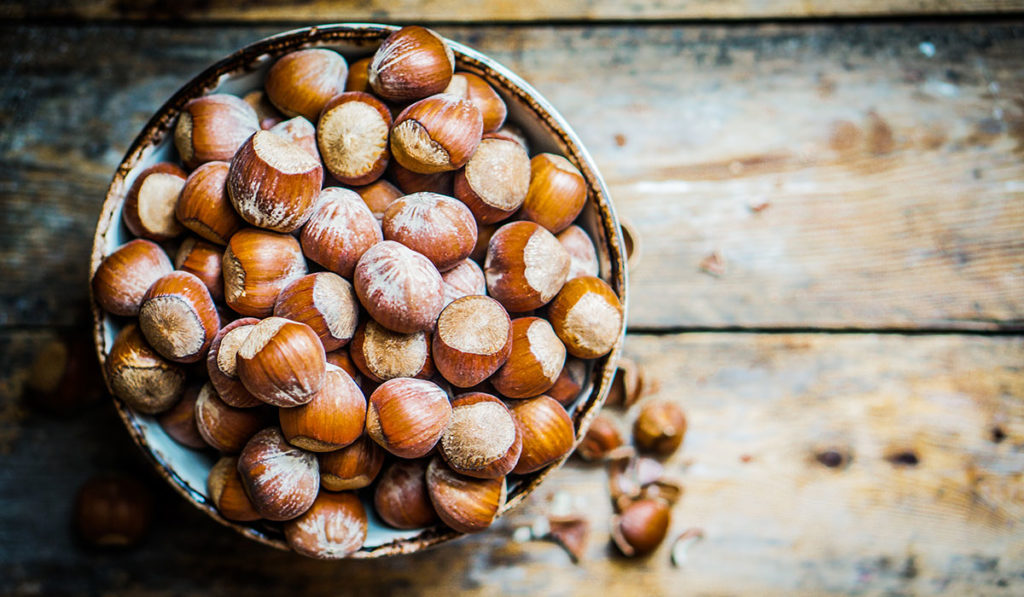
Whole hazelnut kernels
Whole, natural hazelnuts are found in almost all nut and trail mixes. What’s more, unprocessed hazelnut kernels can be used in sweet pastries as well as savoury dishes. Hazelnuts are also suitable for use in chocolates and pralines.
Roasted hazelnuts
Hazelnuts are usually roasted. This goes for both whole as well as chopped or ground nuts. The brown skin can be easily removed after roasting, fully releasing the flavour of the hazelnut kernels. If you buy hazelnuts roasted, they are heat treated. In many cases, subjecting food to high temperatures reduces the valuable nutrients. With hazelnut kernels, however, most of the nutrients are retained. This is also true for allergens which are still contained in roasted hazelnut kernels. Allergens are only reduced with intense processing – as is the case for spreads for example. Generally speaking, people with a mild form of the allergy can therefore eat such products without any problems.
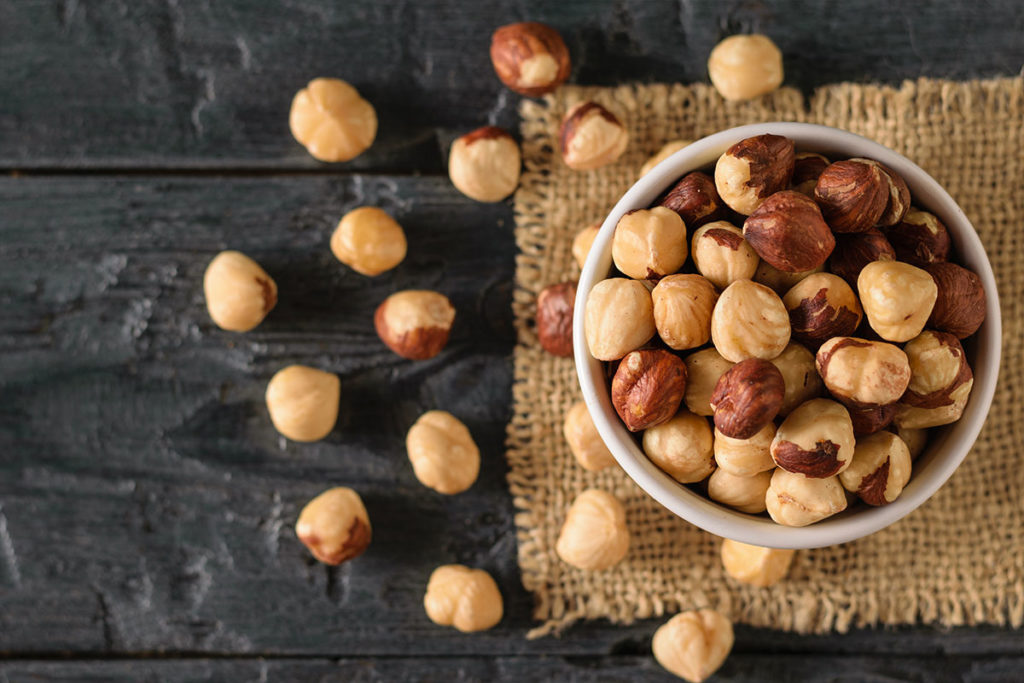
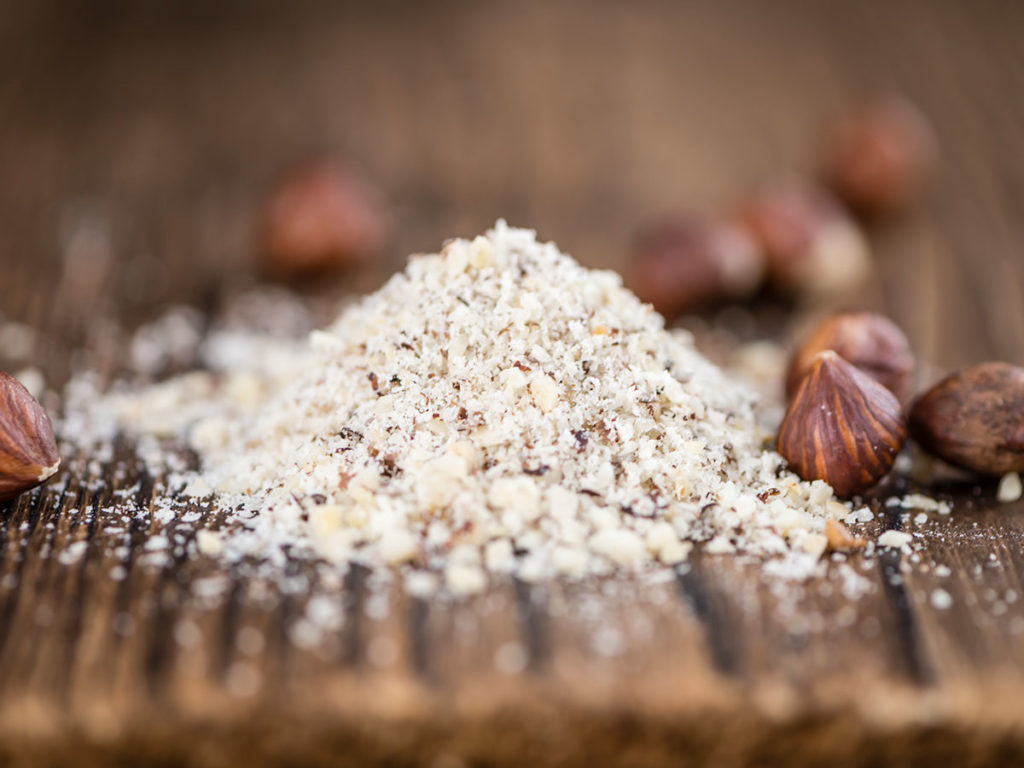
Ground hazelnut kernels
Ground hazelnut kernels can be processed into cookies, cakes and other baked goods. As a result, they can be used as a partial or complete substitute for flour. At the same time, hazelnuts affect the dough, making it juicier and more aromatic. In some cases, it’s necessary to add more liquid to the dough when using hazelnuts.
Compared to conventional flour, hazelnut flour has a higher protein and fibre content. To produce hazelnut flour, unroasted and de-oiled hazelnut kernels are cold pressed. The hazelnut kernel flour then contains fewer calories and retains its characteristic, nutty flavour. If you buy hazelnut flour, it can be used in a number of different ways – such as for baking cakes, in fruit salad or in muesli.
Further varieties of hazelnuts in the wholesale trade
Chopped and flaked hazelnuts are suitable for versatile use in baking and for other food. When you buy chopped or flaked hazelnuts, keep in mind that they have a reduced shelf life compared to whole hazelnut kernels. Correct storage is all the more important; we explain this in detail in the section “Shelf life and storage”.
Hazelnut paste makes for a nutritious spread and is ideal for refining soups and sauces. Gianduja is particularly popular. It’s a chocolate spread comprising 30 percent hazelnut spread. Gianduja is a semi-finished product primarily used in the food industry for producing sweet goods, such as chocolate, cakes or confectionery. The paste can also be found in a range of pralines, giving flavour to creams and fillings. The term “praline grain” refers to a nut product made from hazelnut kernels and sugar. In addition, industry uses wholesale hazelnuts to produce nougat, spreads containing chocolate as well as hazelnut oil. This oil is suitable for unheated use, for example in salad dressings.
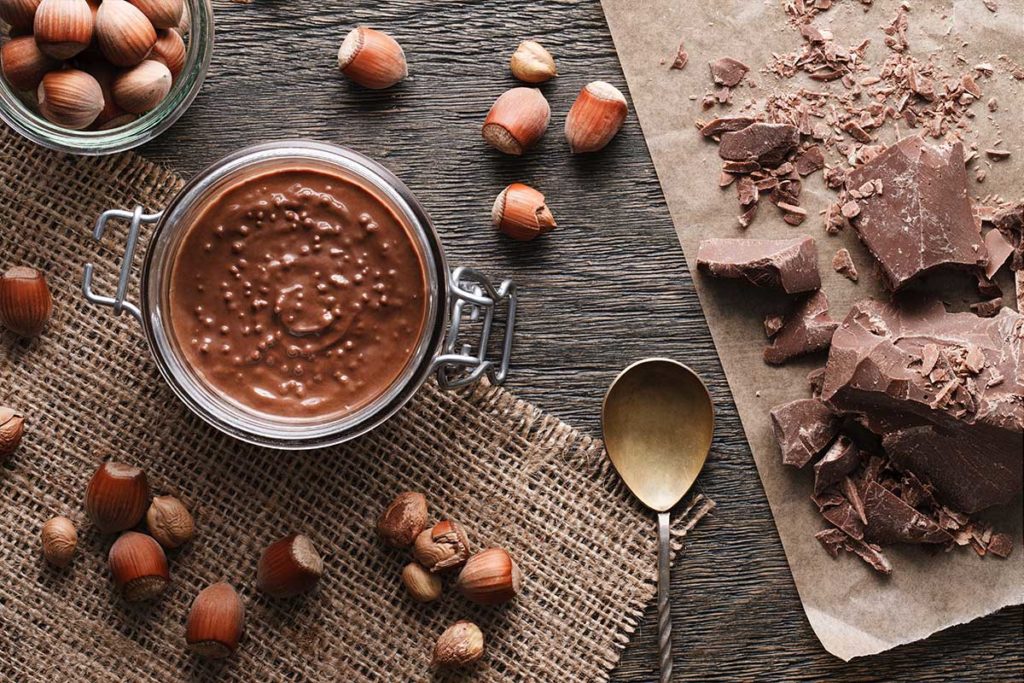
Organic and UTZ hazelnuts
Organic hazelnuts are also available from German cultivation regions. They come from organically run plantations that refrain from the use of chemical fertilisers and pesticides. The use of methyl bromide, sulphur and bleaches is also forbidden for organic hazelnuts from Germany.
The UTZ Certified label marks products in which the agricultural ingredients come from sustainable cultivation. The programme sets precises rules for growing and harvesting, including banning the use of pesticides in relevant quantities as well as unsafe working conditions. Furthermore, the programme is committed to fighting child labour and the destruction of natural ecosystems. Today, more than 10,000 products are available with the quality label. Hazelnuts with the UTZ label can be bought in the wholesale trade, guaranteeing compliance with strict standards.
Hazelnuts as animal feed
Hazelnut kernels are not only popular among people, they are also suitable as animal feed. Many species consume hazelnuts in nature, such as various species of mice and squirrels. A bug is even named after this diet: the hazelnut weevil. In nature, however, hazelnuts are only an accessible source of nutrition for animals able to break the hard shell of the hazelnut kernels.
Shelf life and storage
The shelf life of hazelnuts from the wholesale trade depends on whether they have been processed. The quality of whole nuts can be checked using the shake test. If a noise can be heard when shaking the nut, this indicates it is already rather old. Freshly harvested hazelnut kernels fit tightly against the shell and therefore emit no sound. Hazelnuts in the shell can be stored for several months. In Germany, however, around 90 percent of hazelnuts are imported and consumed without the shell.
Ground, roasted and shelled hazelnuts have a much shorter shelf life and are susceptible to mould. Mould contains substances harmful to health, so any affected hazelnut kernels should no longer be consumed. To store hazelnuts correctly and prolong shelf life as much as possible, the following criteria are important when choosing a suitable storage location:
Cool temperatures
Dark and dry environment
Airtight packaging
When buying small quantities of processed hazelnut kernels, it’s a good idea to store them in the refrigerator. This not only prevents mould but also retains the flavour of the hazelnut kernels.
Our hazelnut kernels are certified:

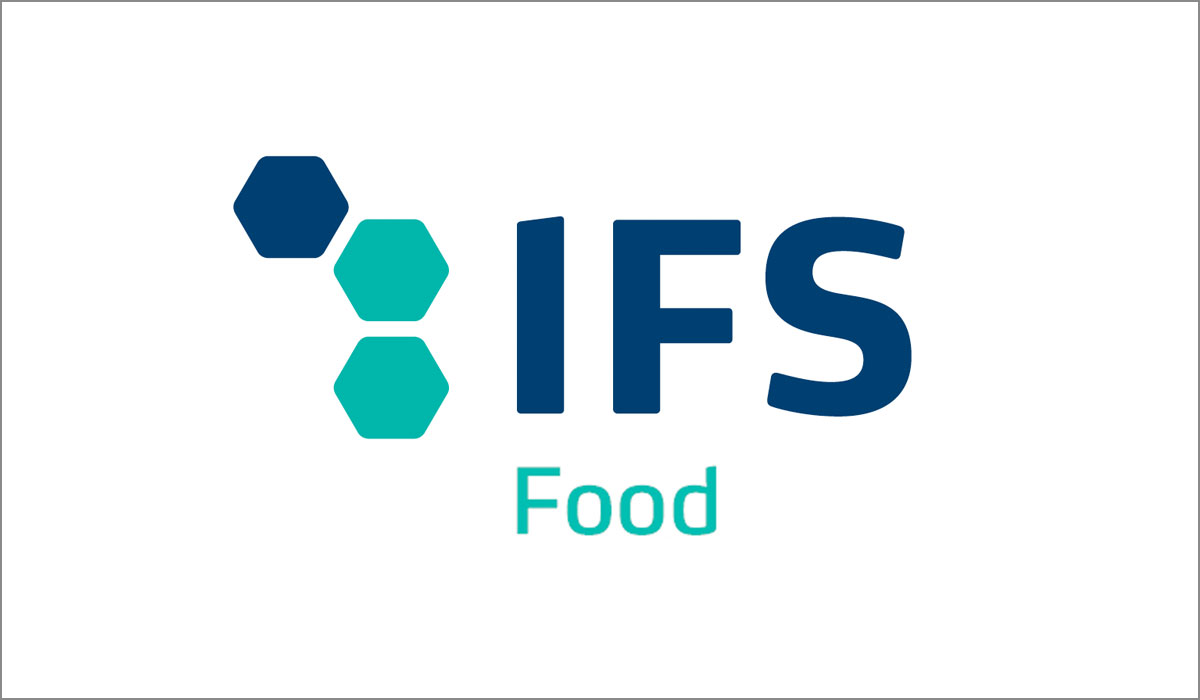

Buy organic hazelnuts from wholesaler August Töpfer & Co.
Hazelnut kernels are among the most popular nut varietiesin Germany. Hazelnuts in all common varieties are available in the wholesale trade, enabling versatile use of the popular nut. Order hazelnuts online from traditional wholesaler August Töpfer & Co.. Benefit from our strict quality checks that only accept high-quality products in our range. Due to close cooperation with our producers, we also offer the highest quality at fair prices. We will be happy to pass on our extensive experience and advise you in selecting the right products.
